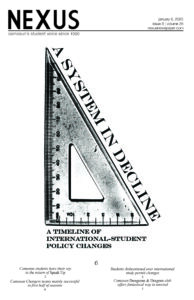January 22, 2024 – Minister of immigration, refugees, and citizenship Marc Miller announces that the government of Canada is implementing a cap on international student permit applications for two years. According to the federal government, the new measures were put in place to ensure that international students have the proper support when entering Canada and to stop institutions from increasing international student intake to drive revenues. Because of the cap, 2024 will now see a 35-percent decrease in international students from 2023.
February 21, 2024 – British Columbia Federation of Students (BCFS) chairperson Melissa Chirino tells Nexus that while the cap may be a good first step in protecting international students from exploitation from less credible institutions, the BCFS urges the government to give more funding to post-secondary institutions.
“We acknowledge that a lot of institutions do heavily rely on international [student] fees,” Chirino told us. “One of our advocacy asks that we’ve had for years is there needs to be more funding in the post-secondary sector because we’ve become more reliant on these international fees, and, really, our argument prior was that if anything were to happen, we would really feel the impact of that. I think after that announcement, we were worried about the implication that it has for our institutions, and how are they going to have all the services on campus? How is that going to affect their budget? Are they going to increase the international student fees [for students] who are currently here? There is a lot of concern there.”

March 5, 2024 – Camosun College announces its provincial attestation letter (PAL) allocation as set by the Ministry of Post-Secondary Education and Future Skills. Between January 22, 2024 and January 21, 2025, the college will be able to issue up to 1,643 PALs to prospective international students. Both the college and the Camosun College Student Society (CCSS) are pleased with this allocation amount.
“We still have our complement of returning international students in addition to our permits for new students,” Camosun acting vice president of enrolment and community engagement Richard Stride told Nexus at the time. “So, based on the number that the IRCC has stated and the provincial government has given us and the 1,643, we do not see any decline in our international student intake and total number of international students over the coming year.
September 18, 2024 – Immigration, Refugees and Citizenship Canada (IRCC) announces it will be limiting eligibility to Canada’s post-graduation work permit program, allowing only for international students studying within 966 programs in five eligible areas of education: agriculture and agri-food; health care; science, technology, engineering, and mathematics; skilled trades; and transportation.
September 18, 2024 – IRCC also announces that beginning November 1, 2024, the most recent policy changes add an additional 10-percent decrease to all intakes from a previous reduction, capping permits at 437,000 for both 2025 and 2026 enrolments. The cap now includes graduate and doctoral students, who were exempt from the former restrictions.
“We were almost expecting the further decrease in the quota amount, which may have some effect on Camosun, but that is by far not the most serious program change that will impact Camosun,” Camosun College Student Society (CCSS) executive director Michel Turcotte told Nexus at the time. “That change is the post-graduate work permit requirements being restricted to particular programs in college environments. And that, I think, will have significant impacts for the most part moving forward.”
October 1, 2024 – Camosun says in an email to staff and faculty that the fall semester international student enrolments have already seen a drop of 400 students from its target of 2,200.
October 2, 2024 – The college runs an opinion piece written by BC Colleges president Colin Ewart on its website, speaking out against the changes.
Early November, 2024 – The Camosun College Faculty Association (CCFA) travels to Ottawa with the Vancouver Community College Faculty Association and North Island College Faculty Association to lobby against the federal government decision. The CCFA and CCSS also meet with NDP MP Laurel Collins on campus in November to discuss the situation.
November 12, 2024 – Camosun sends an email to staff and faculty saying that, to offset a projected $5-million deficit in 2025/26, it needs to make further budget reductions through layoffs and eliminating vacant positions. The email gives emergency crisis line contact info.
November 13, 2024 – Turcotte tells Nexus that “it’s important to recognize that it was inappropriate for governments to use international students as a means of funding post-secondary education in British Columbia and in Canada generally, that acting so dramatically in this way in response to perceived political pressure actually hurts domestic students and the international students already here. This will have huge ramifications for training domestic students in the programs of their choice or the ones that will meet Canada’s various labour market needs. The CCSS calls on governments at all levels to respond appropriately to this crisis and to make the decisions that are actually in British Columbia’s and Canada’s best interests going forward.”
November 15, 2024 – The college sends an email to staff and faculty with the subject line “Positioning the college for success.” In it, it discusses how it will be merging and reducing its areas of study into five categories: Arts, Access and Academic Preparation; Business; Health, Human Services and Sport Science; Science and Technology; and Trades, Training and Professional Studies.
November 20, 2024 – The Camosun College Faculty Association (CCFA) tells Nexus that it disagrees with how Camosun is handling the situation, claiming the college is violating a BC Labour Relations Code and their contract with the CCFA. The college declines to comment.
